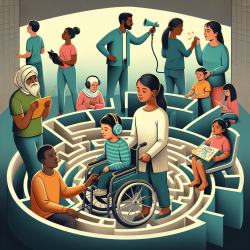As professionals dedicated to the educational and developmental needs of children with disabilities, staying informed and applying research-based strategies is paramount. The comprehensive review of "Disabilities in School-Age Children and Adolescents (1994)" offers invaluable insights into addressing the cognitive and linguistic challenges faced by this demographic. This article aims to guide practitioners in enhancing their skills through the application of research outcomes and encourages further exploration into effective strategies for supporting students with disabilities.
The research discussed in the reviewed article provides a detailed examination of various disabilities affecting school-age children and adolescents. It highlights the importance of tailored interventions that address specific needs, emphasizing the role of educators and specialists in implementing evidence-based practices. By integrating these findings into our approaches, we can improve the educational outcomes and overall well-being of students with disabilities.
Key Takeaways for Practitioners:
- Individualized Approach: The diversity of disabilities necessitates personalized educational plans. Understanding the unique challenges and strengths of each student allows for more effective interventions.
- Collaboration is Crucial: Working closely with families, therapists, and other professionals fosters a supportive environment that encourages student progress. Sharing insights and strategies can lead to more comprehensive support.
- Focus on Functional Skills: Developing practical skills that students can apply in their daily lives is essential. Emphasizing real-world applications of learning can enhance independence and confidence.
- Incorporate Technology: Assistive technologies can play a significant role in facilitating learning and communication. Staying abreast of technological advancements can provide students with innovative tools to overcome barriers.
- Continuous Professional Development: The field of special education is ever-evolving. Participating in ongoing training and research ensures that practitioners are equipped with the latest knowledge and techniques.
Implementing the outcomes of this research not only requires a commitment to evidence-based practices but also a dedication to ongoing learning and adaptation. As educators and specialists, we must be proactive in seeking out new information and open to revising our approaches in light of emerging evidence.
Moreover, fostering an inclusive educational environment where all students feel valued and supported is fundamental. This entails not only addressing academic needs but also promoting social inclusion and emotional well-being. By embracing a holistic view of student development, we can contribute to a more equitable and accessible educational landscape for children with disabilities.
In conclusion, "Disabilities in School-Age Children and Adolescents (1994)" serves as a critical resource for practitioners aiming to enhance their skills and improve the lives of students with disabilities. By applying the insights and strategies outlined in this research, we can make significant strides in supporting the diverse needs of our students. For those interested in delving deeper into the findings and recommendations, I encourage you to read the original research paper.










